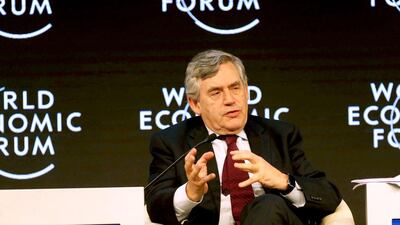DEAD SEA, JORDAN // Gordon Brown, the former UK prime minister and current head of the World Economic Forum’s infrastructure initiative, urged wealthy Arabian Gulf states and individuals to invest in much-needed infrastructure projects in the poorer parts of the Middle East.
There is a huge spending deficit on infrastructure in the region compared to other parts of the world, Mr Brown noted.
According to a World Bank report, the Middle East and North Africa taken together invests only about 5 per cent of its collective GDP in infrastructure, compared to 15 per cent for China and 10 per cent on average globally.
“There is no substitute for governments in the region having well thought-out plans for public-private partnerships,” Mr Gordon said. “Without that things are not going to happen.”
But, he added, there is an enormous amount of untapped wealth in the richer parts of the region – particularly Gulf sovereign wealth funds – that could be accessed if the right structures were in place.
“Interest rates have been low and there is a surplus of savings. So even with the barriers at the moment – low oil prices, banks in a difficult position to lend because of Basel 3 regulations – I think low interest rates and the surplus of savings make it possible to make progress” on infrastructure investment, Mr Brown said.
Speaking on the last day of the WEF's Forum on the Middle East and North Africa, Mr Brown and others emphasised that infrastructure investment provided healthy returns for investors when managed properly, as well as creating huge amounts of much needed jobs for the region.
According to the World Bank, infrastructure projects return between 5 per cent and 25 per cent to investors.
Majid Jafar, the chief executive of Sharjah-based Crescent Petroleum, which invests in various energy projects in Egypt and Iraq, said studies show that every US$1 billion invested in infrastructure creates 26,000 jobs in GCC countries, but for developing oil countries such as Iraq it rises to 40,000 jobs and for oil-importing countries such as Jordan, which hosted this year's WEF meeting, it is 100,000 jobs.
“But private capital is a coward – it looks for stability and a good return,” said Mr Jafar. Therefore the right partnerships are required to provide guarantees to get projects off the ground.
The task of the WEF’s global infrastructure initiative, which Mr Brown is leading, is to bring together government projects with traditional international lending organisations such as the World Bank, newer ones such as China’s Asia Infrastructure Investment Bank, agencies such as the Multilateral Investment Guarantee Agency (Miga) and private capital to build energy, transport, healthcare and education infrastructure.
“If you bring together Miga with a Saudi sovereign wealth fund to finance a project to build telecoms infrastructure in Palestine, you are going to get it done no problem,” said Thierry Déau, the founder of Meridiam, a French government-supported long-term infrastructure investment company.
amcauley@thenational.ae
Follow The National's Business section on Twitter

